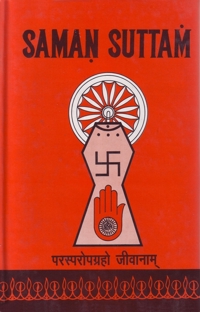10. Samyama Sutra
PRECEPTS ON SELF-RESTRAINT
Appa nai veyarani, appa me kudasamali.
Appa kamaduha dhenu, appa me nandanam vanam. (122)My soul is to me the river Vaitarani and the thorny tree Salmali. But is to me the cow Kamadhenu (as it yields all that I desire) and the heavenly garden Nandanavana also. (122)
appa katta vikatta ya, duhana ya suhana ya.
Appa mittamamittam ca, dupatthiya supatthio. (123)The sould is the doer and enjoyer of both happiness and misery; it is his own friend when it acts righteously and foe when it acts unrighteously. (123)
Egappa ajie sattu, kasaya indiyani ya.
Te jinittu jahanayam, viharami aham muni. (124)One.s unconquered self, unconquered passions and uncontrolled sense-organs are one.s own enemies. Oh: monk having conquered them, I move about righteously. (124)
Jo sahassam sahassanam, samgame dujjae jine.
Egam jinejja appanam, esa se paramo jao. (125)One may conquer thousands and thousands of enemies in an invincible battle; but the supreme victory consists in conquest over one.s self. (125)
Appanameva jujjhahi, kim te jujjhena bajjhao.
Appanameva appanam, jaitta suhamehae. (126)Fight with thyself; what is the good in fighting against external foes? One can get supreme happiness by conquering one.s own self by one.s self. (126)
Appa ceva dameyavvo, appa hu khalu duddamo.
Appa damto suhi hoi, assim loe parattha ya. (127)One must conquer one.s own self, because it is difficult to conquer it. One who has conquered one's own self attains bliss in this world as well as in the next. (127)
Varam me appa damto, samjamena tavena ya.
Maham parehim dammamto, bandhanehim vahehi ya. (128)It is proper that I must conquer my self by selfrestrainst and penance.But it is not proper that I should be vanquished by others and made a prisoner or killed by them. (128)
Egao viraim kujja, egao ya pavattanam.
Assamjame niyattim ca, samjame ya pavattanam. (129)One should desist from action in one direction and undertake action in another direction. One should avoid being incontinent and should practise self-restraint. (129)
Rage dose ya do pave, pavakamma pavattane.
Je bhikkhu rembhai niccam, se na acchai mandale. (130)The two sins attachment and aversion lead one to commit sinful acts. That monk who always besieges them will not wander in this mundane existence. (130)
Nanena ya jhanena ya, tavobalena ya bala nirubhanti.
Imdiyavisayakasaya, dhariya turaga va rajjuhim. (131)Just as a horse can be controlled by a bridle, the sensual pleasures and passions can be forcefully kept under control by knowledge, meditation and power of penance. (131)
Uvasamam puvanita, gunamahata jinacarittasarisam pi.
Padivatemti kasaya, kim puna se saragtthe. (132)When suppressed, passion can bring about the spiritual degeneration of even the most virtuous monk, who in his conduct is akin to Jina himself, what can we say of monks who are under the sway of attachment? (132)
Ih uvasamtakasao, lahai anantam puno vi padivayam.
Na hu bhe visasiyavvam, theve vi kasayasesammi. (133)Even one who has subsided or repressed all his passions, once more experiences a terrible spiritual degeneration, hence one ought not to become complacent when some remnants of passions still continue. (133)
Anathovam vanathovam, aggithovam kasayathovam ca.
Na hu bhe visasiyavvam, thovam pi hu tam bahu hoi. (134)One should not be complacent with a small debt, slight wound, spark of fire and slight passion, because what is small (today) may become bigger (later). (134)
Koho pim panasei, mano vinayanasano.
Maya mittani nasei, loho savvavinasano. (135)Anger destroys love, pride destroys modesty, deceit destroys friendship; greed is destructive of everything. (135)
Uvasamena hane koham, manam maddavaya jine.
Mayam ca.jjavabhavena, lobham samtosao jine. (136)One ought to put an end to anger through calmness, pride by modesty, deceit by straight-forwardness and greed by contentment. (136)
Jaha kumme saamgai, sae dehe samahare.
Evam pavaim mehavi, ajjhappena samahare. (137)Just as a tortoise protects itself by withdrawing all its limbs within its own body, similarly a wise man protects himself from evil by withdrawing himself from extrovertness. (137)
Se janamajanam va, kattum ahammiam payam.
Samvare khippamappanam, biyam tam na samayare. (138)When an unrighteous deed is committed, whether consciously or unconsciously, one should immediately control oneself so that such an act is not committed again. (138)
Dhammarame care bhikku, dhiiman dhammasarahi.
Dhammaramarae dante, bambhacerasamahie. (139)A monk who is a courageous driver of the chariot of religion, engrossed in the delight of religion, selfcontrolled and devoted to celibacy, wanders in the garden of religion. (139)
 Jinendra Varni
Jinendra Varni

